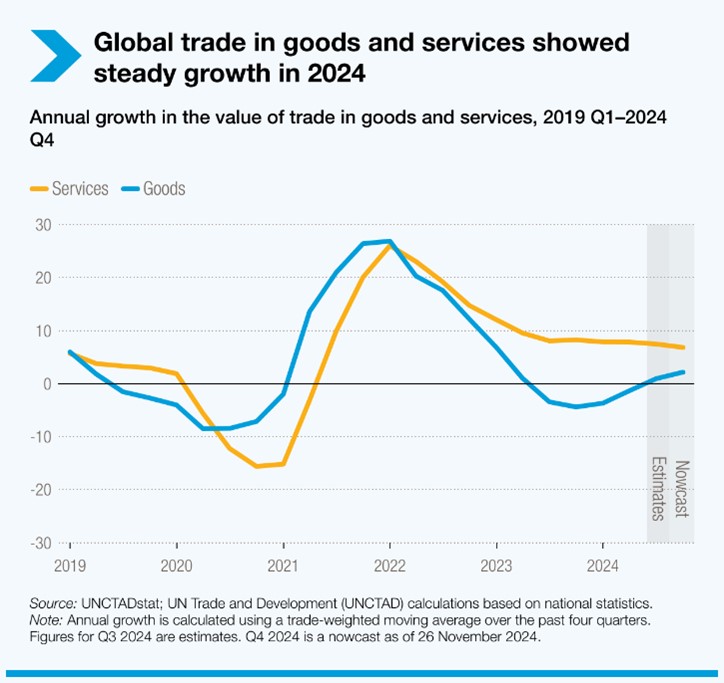World trade is on track to hit a record $33 trillion in 2024, but risks of expanded trade tensions and ongoing geopolitical challenges cast uncertainty over the outlook for 2025.
- Global trade is poised to hit an all-time high of nearly $33 trillion in 2024, with a $1 trillion increase largely driven by a 7% rise in services trade.
- Developing economies face slower trade growth, but high-growth sectors like information and communication technology (ICT) and apparel offer opportunities for diversification and resilience.
- Stable global growth and easing inflation create a window for developing economies to strengthen their trade position amid rising geopolitical uncertainties.
Global trade is set to reach a record $33 trillion in 2024, according to the latest Global Trade Update by UN Trade and Development (UNCTAD). This $1 trillion increase, reflecting 3.3% annual growth, highlights resilience in global trade despite persistent challenges. Robust growth in services trade, up 7% for the year, accounted for half of the expansion, while goods trade rose 2% but remained below its 2022 peak.
Global trade grows 3.3% in 2024, driven by a 7% rise in trade in services.

Opportunities amidst uncertainty
Developing economies, traditionally strong drivers of global trade, faced headwinds in 2024, with imports contracting 1% and South-South trade falling by the same margin in the third quarter. In contrast, developed economies led Q3 growth, with stable demand driving a 3% rise in imports and 2% in exports.
Despite these challenges, opportunities remain for developing economies to capitalize on high-growth sectors. ICT and apparel trade surged, with increases of 13% and 14%, respectively, in the third quarter 2024. This growth underscores the potential for diversification and entry into value-added industries. Stable global growth forecasts and easing inflation also present a chance to build resilience in 2025.
Sectoral pressures and growth prospects
While ICT and apparel showed strong momentum, traditional sectors critical to developing economies faced declines. Energy trade fell 2% for the quarter and 7% for the year, while metals trade contracted by 3% both quarterly and annually. Automotive trade dropped 3% in Q3 but is expected to end the year with modest 4% growth.
A call for strategic action
UNCTAD urges developing economies to adopt targeted policies that enhance trade diversification and invest in high-value sectors to mitigate risks. The organization underscores that trade is a cornerstone of sustainable development. To capitalize on opportunities in 2025, developing economies require coordinated support to navigate uncertainty, reduce dependencies and strengthen global market links.
----------------------------------
**About UN Trade and Development: **
UN Trade and Development (UNCTAD) is dedicated to promoting inclusive and sustainable development through trade and investment. With a diverse membership, it empowers countries to harness trade for prosperity.
Note to Editors: Additional background information and quotes can be provided upon request.
----------------------------------


